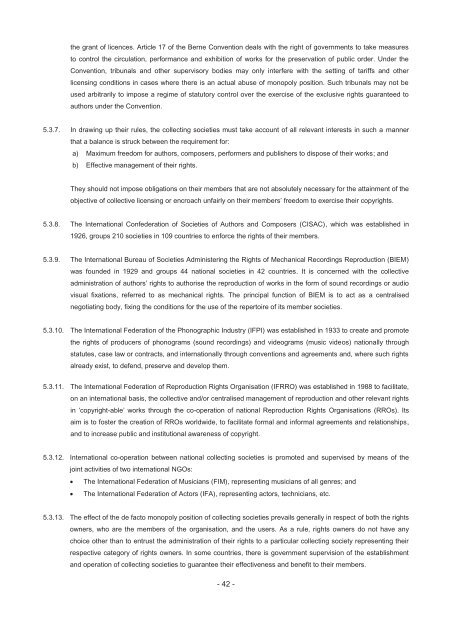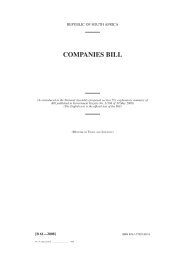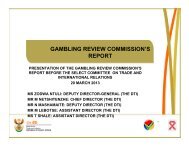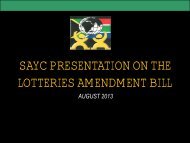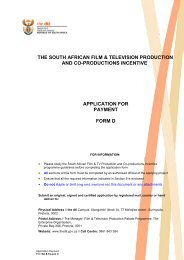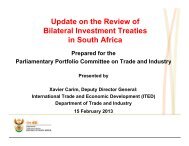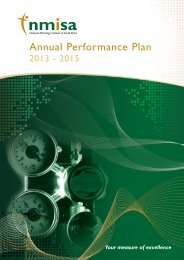Copyright Review Commission Report - ICT Law and Regulation ...
Copyright Review Commission Report - ICT Law and Regulation ...
Copyright Review Commission Report - ICT Law and Regulation ...
- No tags were found...
You also want an ePaper? Increase the reach of your titles
YUMPU automatically turns print PDFs into web optimized ePapers that Google loves.
the grant of licences. Article 17 of the Berne Convention deals with the right of governments to take measuresto control the circulation, performance <strong>and</strong> exhibition of works for the preservation of public order. Under theConvention, tribunals <strong>and</strong> other supervisory bodies may only interfere with the setting of tariffs <strong>and</strong> otherlicensing conditions in cases where there is an actual abuse of monopoly position. Such tribunals may not beused arbitrarily to impose a regime of statutory control over the exercise of the exclusive rights guaranteed toauthors under the Convention.5.3.7. In drawing up their rules, the collecting societies must take account of all relevant interests in such a mannerthat a balance is struck between the requirement for:a) Maximum freedom for authors, composers, performers <strong>and</strong> publishers to dispose of their works; <strong>and</strong>b) Effective management of their rights.They should not impose obligations on their members that are not absolutely necessary for the attainment of theobjective of collective licensing or encroach unfairly on their members’ freedom to exercise their copyrights.5.3.8. The International Confederation of Societies of Authors <strong>and</strong> Composers (CISAC), which was established in1926, groups 210 societies in 109 countries to enforce the rights of their members.5.3.9. The International Bureau of Societies Administering the Rights of Mechanical Recordings Reproduction (BIEM)was founded in 1929 <strong>and</strong> groups 44 national societies in 42 countries. It is concerned with the collectiveadministration of authors’ rights to authorise the reproduction of works in the form of sound recordings or audiovisual fixations, referred to as mechanical rights. The principal function of BIEM is to act as a centralisednegotiating body, fixing the conditions for the use of the repertoire of its member societies.5.3.10. The International Federation of the Phonographic Industry (IFPI) was established in 1933 to create <strong>and</strong> promotethe rights of producers of phonograms (sound recordings) <strong>and</strong> videograms (music videos) nationally throughstatutes, case law or contracts, <strong>and</strong> internationally through conventions <strong>and</strong> agreements <strong>and</strong>, where such rightsalready exist, to defend, preserve <strong>and</strong> develop them.5.3.11. The International Federation of Reproduction Rights Organisation (IFRRO) was established in 1988 to facilitate,on an international basis, the collective <strong>and</strong>/or centralised management of reproduction <strong>and</strong> other relevant rightsin ‘copyright-able’ works through the co-operation of national Reproduction Rights Organisations (RROs). Itsaim is to foster the creation of RROs worldwide, to facilitate formal <strong>and</strong> informal agreements <strong>and</strong> relationships,<strong>and</strong> to increase public <strong>and</strong> institutional awareness of copyright.5.3.12. International co-operation between national collecting societies is promoted <strong>and</strong> supervised by means of thejoint activities of two international NGOs: The International Federation of Musicians (FIM), representing musicians of all genres; <strong>and</strong> The International Federation of Actors (IFA), representing actors, technicians, etc.5.3.13. The effect of the de facto monopoly position of collecting societies prevails generally in respect of both the rightsowners, who are the members of the organisation, <strong>and</strong> the users. As a rule, rights owners do not have anychoice other than to entrust the administration of their rights to a particular collecting society representing theirrespective category of rights owners. In some countries, there is government supervision of the establishment<strong>and</strong> operation of collecting societies to guarantee their effectiveness <strong>and</strong> benefit to their members.- 42 -


